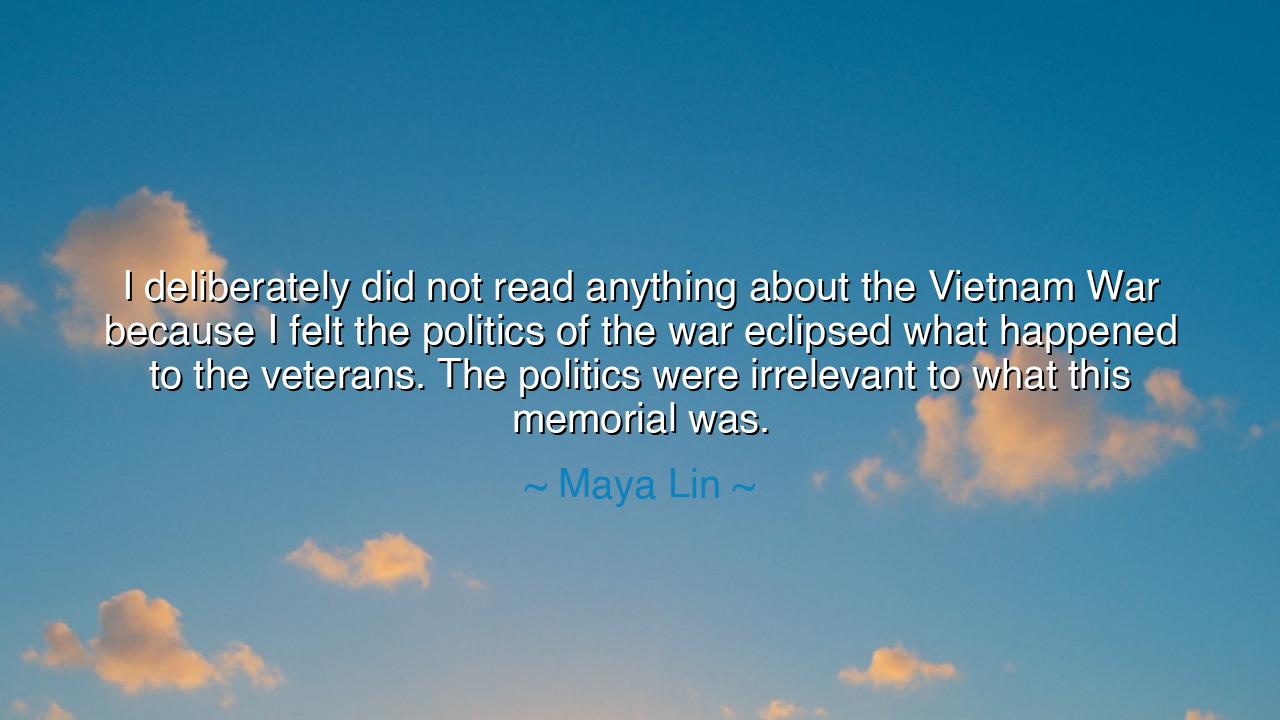
I deliberately did not read anything about the Vietnam War
I deliberately did not read anything about the Vietnam War because I felt the politics of the war eclipsed what happened to the veterans. The politics were irrelevant to what this memorial was.






The words of Maya Lin remind us of a truth both simple and profound: the heart of remembrance must not be chained to the noise of politics, but must rest upon the sacrifice of the human spirit. When she declared that she would not read of the Vietnam War’s politics, she was guarding her vision from the clamor of men who argued over policy while soldiers bled, wept, and endured. The Vietnam Veterans Memorial was not born to judge the war, but to hold vigil for the fallen, as the ancients held sacred ground for their heroes.
In this, her wisdom shines. For history has often blurred the lines between cause and consequence, between the decisions of rulers and the suffering of the ordinary. Yet the memorial speaks not of the righteousness of one side or the folly of another—it whispers only of names. Names carved in stone, unadorned, unjudged, shining like constellations in black granite. The politics fade; the human cost remains eternal.
Consider the story of Jan Scruggs, a soldier who returned home from the jungles of Vietnam, scarred in body and spirit. He dreamed of a place where his brothers-in-arms might be remembered with dignity, not drowned in debates of foreign policy. It was his vision that gave birth to the idea of a memorial, and Lin’s design gave it form. Thus, the memorial itself became a bridge, allowing a divided nation to mourn together, without demanding agreement on the war’s meaning.
The ancients too knew this path. In the ruins of Thermopylae, an inscription once read: “Go tell the Spartans, stranger passing by, that here obedient to their laws we lie.” No word of politics, no mention of strategy—only honor for the fallen. In this way, Lin walked the road of old wisdom, lifting her gaze above strife, fixing her art upon memory, not upon argument.
So let this lesson be carried forward: when we honor the dead, we must silence the quarrels of the living. For the quarrel belongs to time, but remembrance belongs to eternity. The memorial stands as a teacher, telling us that the noblest task is not to weigh the worth of war, but to ensure that those who bore its burden are never forgotten.






DANguyen Duc Anh
Maya Lin’s focus on the veterans’ experiences over the political debates surrounding the Vietnam War is refreshing. It’s easy to get caught up in political arguments, but Lin’s dedication to memorializing the people affected by the war instead of the politics is a powerful choice. I wonder, though, could this have left out the complexities of how the war’s politics shaped the public perception of those very veterans?
GDGold D.dragon
Maya Lin’s decision to not engage with the politics surrounding the Vietnam War when designing the memorial really speaks to her desire to honor the soldiers themselves. But it makes me ask: is it possible to separate the politics from the impact of the war on veterans? Would a more politically aware memorial still have served the purpose of honoring the men and women who fought? Could blending the two perspectives have offered more depth?
AAnh
Maya Lin’s idea of focusing solely on the veterans' experiences rather than the politics of the Vietnam War is a thoughtful one, but I wonder if it risks oversimplifying the issue. The politics behind a war often influences the way soldiers are treated when they return, so wouldn’t it be important to acknowledge that connection? Can we truly separate the personal from the political when it comes to war and its lasting effects on veterans?
BD10a3-07-Nguyen Thi Bich Diem
Maya Lin’s approach to the Vietnam War memorial is intriguing, but I wonder if her decision to disregard the political side of the war was the right one. Politics often shapes how we view historical events, and ignoring it might make it harder to understand the full scope of the veterans' experiences. Could there have been a way to incorporate both the personal and political elements to give a more complete picture?
AKAnh Kieu
I really admire Maya Lin’s perspective on the Vietnam War memorial. The idea that the politics of the war should not overshadow the veterans’ experiences resonates deeply. But, I wonder, can we completely separate the political aspects of war from its impact? Is it possible to honor the veterans without acknowledging the larger political context that shaped their experiences? How do we balance honoring individuals while still recognizing the complex political forces at play?